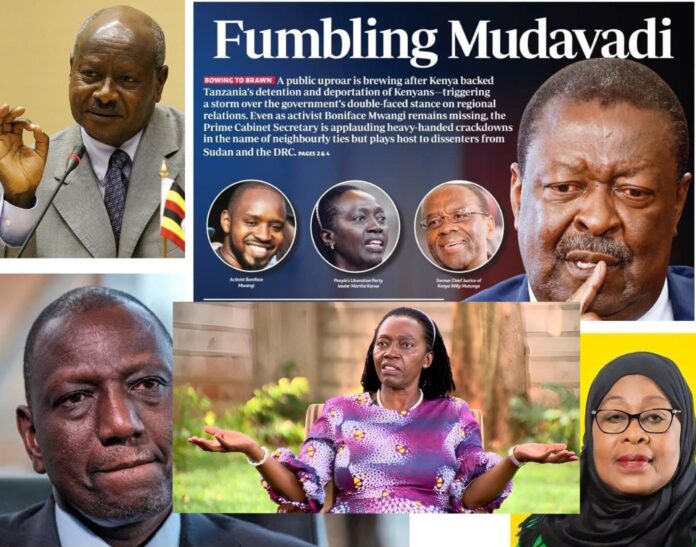By Bakinyumyadouglas
East Africa stands at a critical juncture. The region, once buoyed by optimism for democratic reforms and integration under the East African Community (EAC), is now increasingly marked by authoritarian resurgence, militarized governance, and the suppression of dissent.
At the center of this troubling shift is Uganda, whose military-influenced policies appear to be casting a long shadow over the region’s political trajectory—most recently evidenced by events unfolding in Tanzania.
The deportation of Kenya’s former Justice Minister and respected human rights advocate Martha Karua from Tanzania sends a chilling message to all who believe in regional solidarity, the rule of law, and civic accountability.
Karua, who had traveled to Dar es Salaam to observe the court trial of Tanzanian opposition leader TunduLissu, was not only denied entry but subjected to hours of unjust interrogation alongside lawyer Gloria Kimani and activist Lynn Ngugi.
Their expulsion, reportedly without official explanation, exemplifies a growing intolerance of legal oversight, public scrutiny, and international observation in politically sensitive cases across East Africa.
What’s alarming is not just the act of deportation itself, but the broader regional implications it underscores. East Africa is witnessing an alarming shift as Uganda’s militarized governance tightens its grip on the East African Community (EAC).
Under President YoweriMuseveni, Uganda has been accused of undermining democratic norms through coercion, arbitrary arrests, and a military-first approach to governance. Now, this repressive playbook is spilling over into neighboring nations like Tanzania, eroding the democratic foundations of the region and threatening the rule of law across the EAC.

The case of TunduLissu—charged with treason, a charge that in Tanzania can carry the death penalty—should have been an opportunity for the East African legal fraternity and civil society to reaffirm the principles of justice, transparency, and the right to a fair trial.
Instead, the Tanzanian government responded with silence, restriction, and intimidation. The decision to deport Karua, who has also represented Uganda’s veteran opposition figure Dr. KizzaBesigye, underscores a growing fear among East African regimes: that solidarity among pro-democracy actors poses a real threat to authoritarian control.
Equally disturbing is the detention of Kenya’s former Chief Justice, Willy Mutunga, upon arrival in Tanzania. Mutunga, known for his unwavering stance on constitutionalism and judicial independence, was reportedly held without cause. That prominent jurists and rights activists are being treated as security threats simply for observing legal proceedings is a stain on the conscience of the EAC.
Even more disappointing, according to Kenya’s bold daily, The Standard Newspaper, is that the Kenyan government reportedly supported the detaining and deportation of Senior Counsel Martha Karua. This betrayal by a nation often regarded as a beacon of regional democracy raises troubling questions about where Kenya truly stands on human rights and constitutionalism. Rather than standing in solidarity with one of its most esteemed legal minds, the state aligned itself—wittingly or not—with authoritarian actions that undermine regional unity and the rule of law.
The silence or vague responses from East African governments on such blatant violations speak volumes. If the East African Community is to remain a meaningful platform for integration, economic cooperation, and collective progress, it must stand on a foundation of shared democratic values. Allowing one nation’s repressive strategies to quietly influence others threatens the very fabric of regional unity.
Uganda’s growing influence in regional politics—through military diplomacy, intelligence networks, and the export of political ideology—raises urgent questions. Are we witnessing the gradual militarization of the EAC’s political culture? And if so, what becomes of the institutions designed to safeguard justice, freedom, and governance?
The actions taken against Karua and her colleagues are not isolated incidents; they are part of a larger pattern of closing civic spaces, criminalizing dissent, and undermining judicial processes in East Africa. These actions betray a fear of accountability and a deliberate strategy to silence the voices that call for democracy and reform.
It is imperative that civil society, regional media, and democratic governments speak out with urgency. The East African Court of Justice must assert its authority and independence. Member states must reaffirm their commitment to basic human rights and the principles enshrined in the Treaty for the Establishment of the East African Community. And the African Union must not remain silent as democratic backsliding becomes normalized in a region that once held so much promise.
East Africa deserves better. The people deserve governments that respect freedoms, embrace transparency, and welcome scrutiny—not regimes that thrive in secrecy and suppress opposition.
The treatment of Martha Karua, Gloria Kimani, Lynn Ngugi, and Willy Mutunga is a wake-up call. If this tide of intimidation is not confronted now, we may find ourselves navigating a region where fear replaces freedom, and silence replaces justice.
Mr Bakinyumya Douglas is a Political TV Producer and TV Host – @BDouglasPaapa



